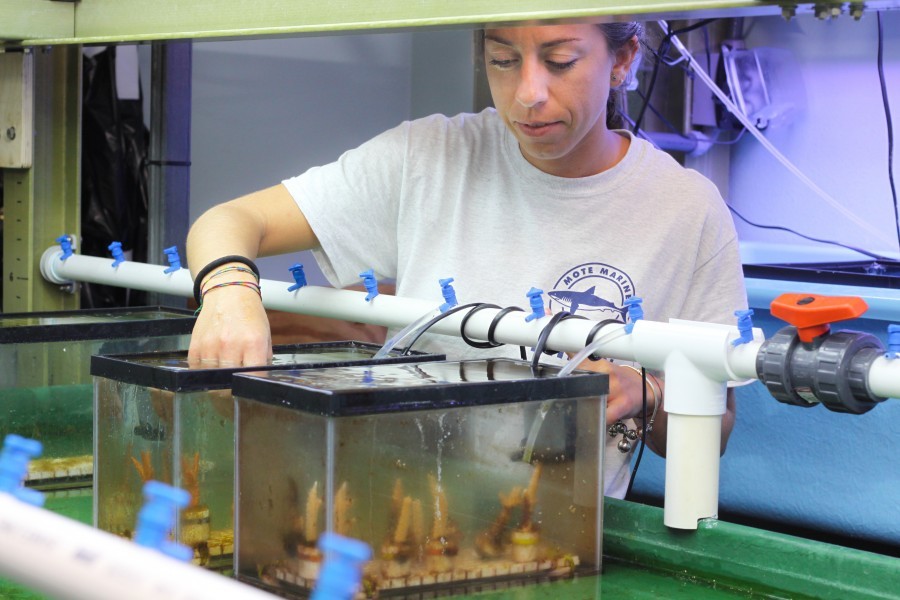Mote welcomes Italian researcher who will focus on ocean acidification
Photo: Cinzia Alessi, Visiting Research Scholar, will be working in Mote Marine Laboratory's Ocean Acidification Program examining the impacts of ocean acidification on coral and sea grass. Credit: Mote Marine Laboratory.
Mote Marine Laboratory is welcoming an Italian researcher through a unique program coordinated in part by University Sarasota Florida Sarasota-Manatee (USFSM).
Cinzia Alessi, who holds a master’s degree in marine ecology from the University of Palermo in Sicily, arrived at Mote about a week ago.
“This was very important to me, important for my research and for my career,” said Alessi, who hopes to pursue a doctoral degree in marine studies at the conclusion of her research. “I feel very lucky to be here.”
Through the J-1 Exchange Visitor Program, Alessi was able to apply last summer for a special visa to conduct research at Mote, an educational partner of USFSM, for up to six months. USFSM coordinated her stay as well as the J-1 visa paperwork.
The U.S. Department of State plays a primary role administering the J-1 exchange visitor program, which was formed to bring international faculty, professors, research scholars and other professionals to the United States to join in educational and cultural programs. USFSM is approved to serve as a J-1 visa sponsor.
Alessi, 29, said she feels grateful to study at Mote, known worldwide for marine research. She’ll join Mote’s Ocean Acidification Program, headed by Dr. Emily Hall, to examine the impacts of ocean acidification on coral and sea grass.
Worldwide, oceans absorb about one-third of all excess carbon dioxide in the atmosphere, which can lead to reductions in pH and dramatic shifts in seawater-carbonate chemistry. Studies show that ocean water is more acidic now than in pre-industrial times and is predicted to approach levels not seen in millions of years.
“It’s nice that she’s here because the research we’re doing on ocean acidification really is a global problem, so it’s good to have an international student like Cinzia introduced to us,” Dr. Hall said. "Mote is an internationally important but home-grown institution and that is in part what makes is so special."
Dr. Jane Rose, dean of USFSM’s College of Arts & Sciences, said the Mote partnership also poses benefits for USFSM.
“Dr. Hall is one of our courtesy faculty in biology, so the international scholar will also assist Dr. Hall with her USFSM teaching, and she’ll have opportunities to work with our students in other ways as well.
“At this time we are exploring partnership with Dr. John Reynolds, another Mote scientist, to sponsor a German scientist to do work related to manatees,” Dr. Rose said. “This international scholar will have similar opportunities to be involved with our students and faculty.”
For most of her time at Mote, Alessi will conduct research at the laboratory on City Island – also where USFSM maintains its teaching labs – but occasionally she might travel to Mote’s facility on Summerland Key in the Florida Keys, which is being renovated into a state-of-the-art international center for marine science, education and conservation. Set to be reconstructed in January, the center will be better equipped to address global threats facing coral reefs.
Alessi, who grew up in the seaside community of Marsala, about an hour north of Palermo, said the ocean has long fascinated her. “When I was 12, I read a book on whales and after that I loved the ocean. I carried that book with me everywhere.”
About USF Sarasota-Manatee (USFSM)
USF Sarasota-Manatee is a regional campus of the University of South Florida System, offering the prestige of a nationally ranked research university with the convenience of a hometown location, including classes in Manatee County and online. Separately accredited, USFSM is ideal for those interested in pursuing a baccalaureate or master’s degree, professional certification, or continuing education credit in a small, personal setting with distinguished faculty and a dynamic curriculum of over 40 academic programs. Website: www.usfsm.edu.
About Mote Marine Laboratory
Founded in 1955, Mote Marine Laboratory & Aquarium is celebrating its 60th year as an independent, nonprofit 501(c)3 research organization. Mote’s 25 research programs are dedicated to today’s research for tomorrow’s oceans, with an emphasis on world-class research relevant to the conservation and sustainability of our marine resources. Mote’s vision also includes positively impacting public policy through science-based outreach and education. Showcasing this research is Mote Aquarium, open from 10 a.m. to 5 p.m. 365 days a year. Learn more at mote.org.
